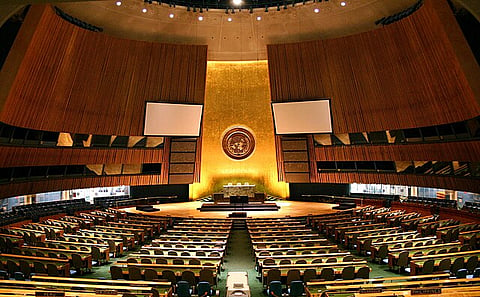UN Establishes Global AI Governance Framework
The United Nations General Assembly has unanimously approved the creation of a groundbreaking advisory body to address the global challenges and opportunities presented by artificial intelligence. The resolution, adopted on August 26, 2025, establishes the Independent International Scientific Panel on Artificial Intelligence; a 40-member expert group tasked with producing evidence-based assessments of AI's societal impacts, risks, and governance needs. This initiative, championed by Costa Rica and Spain, reinforces the UN’s central role in ensuring AI development aligns with human rights and sustainable development goals. Secretary-General António Guterres hailed the decision as "a significant step forward in global efforts to harness AI’s benefits while addressing its risks".
Structure and Mandate of the Scientific Panel
The panel will comprise experts from diverse technological, ethical, and geopolitical backgrounds appointed to three-year terms through an open nomination process overseen by the Secretary-General. Its primary mandate includes publishing annual reports on AI’s global impacts, with a focus on identifying emerging threats to democracy, human rights, and equality. The panel will operate independently to provide rigorous scientific assessments that inform international policymaking, though its recommendations will not be legally binding. The first report is slated for presentation at the inaugural Global Dialogue on AI Governance in July 2026 in Geneva.
Global Dialogue: An Inclusive Forum for Multistakeholder Collaboration
The resolution establishes an annual Global Dialogue on AI Governance, which will convene governments, private-sector leaders, civil society organizations, and researchers starting in 2026. These gatherings aim to foster consensus on ethical frameworks, share best practices, and promote technical cooperation to ensure AI advances the UN’s Sustainable Development Goals. Costa Rican Ambassador Maritza Chan Valverde emphasized that the dialogue reaffirms the UN’s role in guaranteeing AI "serves humanity" amid its unprecedented pace of development. The initiative builds on the Global Digital Compact adopted in the 2024 Pact for the Future, addressing fragmentation in national AI regulations.
Context and Urgency: Addressing Regulatory Gaps and Risks
The decision reflects mounting concern among governments that AI’s rapid advancement, particularly in surveillance, disinformation, and autonomous weapons which could undermine global stability if left unregulated. The EU’s landmark AI Act (2024) and divergent national approaches (e.g., U.S. deregulation versus China’s state-controlled model) have highlighted the need for multilateral coordination. The Panel will specifically address concerns that AI could exacerbate digital divides, with the Group of 77 and China stressing "sovereignty, equity, and transparency" as core principles. Ambassador Valverde noted AI’s development "affects all states," requiring inclusive governance that prioritizes developing countries’ participation.
Selection Process and Next Steps
The Secretary-General will shortly launch an open call for nominations to the Scientific Panel, seeking experts in fields ranging from machine learning ethics to international law. The Panel’s inaugural 2026 report will inform discussions at the first Global Dialogue, with subsequent sessions planned for New York in 2027. The initiative faces practical challenges, including funding constraints within the UN system and ensuring equitable geographic representation. However, the consensus-driven adoption contrasting with U.S.-opposed resolutions on other matters signals strong multilateral commitment to shaping AI’s future.

